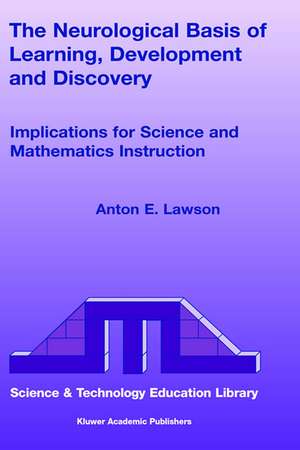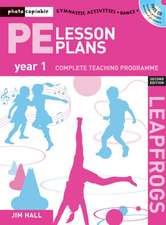The Neurological Basis of Learning, Development and Discovery: Implications for Science and Mathematics Instruction: Contemporary Trends and Issues in Science Education, cartea 18
Autor Anton E. Lawsonen Limba Engleză Hardback – 30 apr 2003
| Toate formatele și edițiile | Preț | Express |
|---|---|---|
| Paperback (1) | 944.82 lei 6-8 săpt. | |
| SPRINGER NETHERLANDS – 4 dec 2010 | 944.82 lei 6-8 săpt. | |
| Hardback (1) | 953.65 lei 6-8 săpt. | |
| SPRINGER NETHERLANDS – 30 apr 2003 | 953.65 lei 6-8 săpt. |
Din seria Contemporary Trends and Issues in Science Education
- 20%
 Preț: 568.91 lei
Preț: 568.91 lei - 20%
 Preț: 814.76 lei
Preț: 814.76 lei - 18%
 Preț: 951.77 lei
Preț: 951.77 lei - 15%
 Preț: 638.43 lei
Preț: 638.43 lei - 15%
 Preț: 636.80 lei
Preț: 636.80 lei - 15%
 Preț: 628.08 lei
Preț: 628.08 lei - 15%
 Preț: 637.46 lei
Preț: 637.46 lei - 18%
 Preț: 951.29 lei
Preț: 951.29 lei - 15%
 Preț: 644.95 lei
Preț: 644.95 lei - 18%
 Preț: 951.91 lei
Preț: 951.91 lei - 18%
 Preț: 1218.66 lei
Preț: 1218.66 lei - 15%
 Preț: 641.71 lei
Preț: 641.71 lei - 15%
 Preț: 697.15 lei
Preț: 697.15 lei - 15%
 Preț: 644.18 lei
Preț: 644.18 lei - 15%
 Preț: 640.55 lei
Preț: 640.55 lei - 15%
 Preț: 640.06 lei
Preț: 640.06 lei - 15%
 Preț: 639.08 lei
Preț: 639.08 lei - 18%
 Preț: 1388.68 lei
Preț: 1388.68 lei -
 Preț: 389.31 lei
Preț: 389.31 lei - 15%
 Preț: 465.66 lei
Preț: 465.66 lei - 18%
 Preț: 1832.08 lei
Preț: 1832.08 lei - 15%
 Preț: 641.85 lei
Preț: 641.85 lei -
 Preț: 398.15 lei
Preț: 398.15 lei - 15%
 Preț: 644.18 lei
Preț: 644.18 lei - 18%
 Preț: 945.47 lei
Preț: 945.47 lei - 15%
 Preț: 644.30 lei
Preț: 644.30 lei - 18%
 Preț: 1215.04 lei
Preț: 1215.04 lei
Preț: 953.65 lei
Preț vechi: 1162.99 lei
-18% Nou
Puncte Express: 1430
Preț estimativ în valută:
182.48€ • 191.04$ • 150.99£
182.48€ • 191.04$ • 150.99£
Carte tipărită la comandă
Livrare economică 05-19 aprilie
Preluare comenzi: 021 569.72.76
Specificații
ISBN-13: 9781402011801
ISBN-10: 1402011806
Pagini: 306
Ilustrații: XVI, 285 p.
Dimensiuni: 156 x 234 x 22 mm
Greutate: 0.68 kg
Ediția:2003
Editura: SPRINGER NETHERLANDS
Colecția Springer
Seria Contemporary Trends and Issues in Science Education
Locul publicării:Dordrecht, Netherlands
ISBN-10: 1402011806
Pagini: 306
Ilustrații: XVI, 285 p.
Dimensiuni: 156 x 234 x 22 mm
Greutate: 0.68 kg
Ediția:2003
Editura: SPRINGER NETHERLANDS
Colecția Springer
Seria Contemporary Trends and Issues in Science Education
Locul publicării:Dordrecht, Netherlands
Public țintă
Professional/practitionerCuprins
How do People Learn?.- The Neurological Basis of Self-Regulation.- Brain Maturation, Intellectual Development and Descriptive Concept Construction.- Brain Maturation, Intellectual Development and Theoretical Concept Construction.- Creative Thinking, Analogy and a Neural Model of Analogical Reasoning.- The Role Analogies and Reasoning Skill in Theoretical Concept Construction and Change.- Intellectual Development During the College Years: Is There a Fifth Stage?.- What Kinds of Scientific Concepts Exist?.- Psychological and Neurological Models of Scientific Discovery.- Rejecting Nature of Science Misconceptions by Preservice Teachers.- Implications for the Nature of Knowledge and Instruction.
Caracteristici
Includes supplementary material: sn.pub/extras











